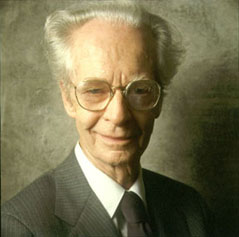
Skinner, often a controversial and polarizing figure, developed a philosophy of science he called radical behaviorism, and founded his own school of experimental research psychology—the experimental analysis of behavior. His analysis of human behavior culminated in his book, Verbal Behavior.
Skinner (1904-1990) discovered and advanced the rate of response as a dependent variable in psychological research, and he invented the cumulative recorder to measure rate of responding as part of his highly influential work on schedules of reinforcement.
Radical behaviorism attempts to understand behavior as a function of environmental histories and reinforcing consequences. Skinner emphasized reinforcement processes—both positive and negative—and they were seen as primary in the shaping of behavior. Both positive and negative reinforcement strengthen behavior, or increase the probability of a behavior reoccurring; the difference is in whether the reinforcing event is something applied (positive reinforcement) or something removed or avoided (negative reinforcement).
In “A Brief Survey of Operant Behavior,” Skinner wrote, “In general, we are much more strongly inclined to do things if they have had immediate reinforcing consequences than if we have been merely advised to do them.”
Behavioral economics and its related area of study, behavioral finance, use social, cognitive and emotional factors to help understand economic decisions of individuals and institutions performing economic functions, including consumers, borrowers and investors, and their effects on market prices, returns and the resource allocation. Behavioral models typically integrate insights from psychology with economic theory.
So there is a linkage between behavioral psychology and behavioral economics.
We can see both positive and negative behavioral principles at work every time we watch or respond to an ad, go to Las Vegas or play the stock market.
All of which brings me to the role of incentives in Vested Outsourcing. Effective (positive) incentives are the oil that makes the Vested model behave smoothly and successfully. They motivate service providers to make decisions that meet everyone’s goals.
In The Vested Outsourcing Manual, we define incentives as a type of award—either monetary or nonmonetary—for the company or service provider. In a Vested pricing model, for example, incentives ideally are based on achievement of incremental performance—that sounds like positive reinforcement!—of the Desired Outcome.
Also, a Vested agreement will incorporate an incentives framework that measures incremental performance and establishes incentive payments, usually through a mathematical formula.
Vested Outsourcing’s Rule 3 says Vested parties should agree on clearly defined and measurable outcomes, and Rule 4 directs the company and service provider to optimize pricing model incentives.
While Skinner’s influential theories on behaviorism and his innovations around tracking and measuring responses were not specifically aimed at the business and outsourcing world, they have had large implications for it.